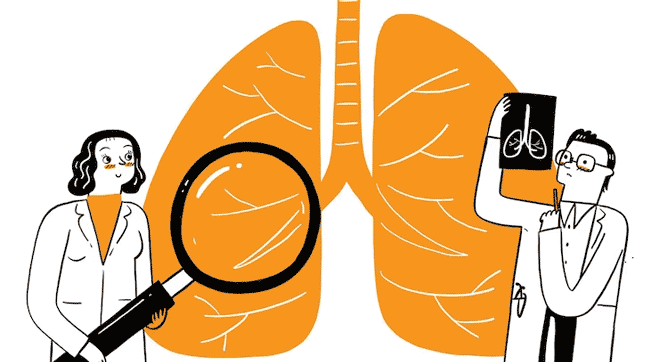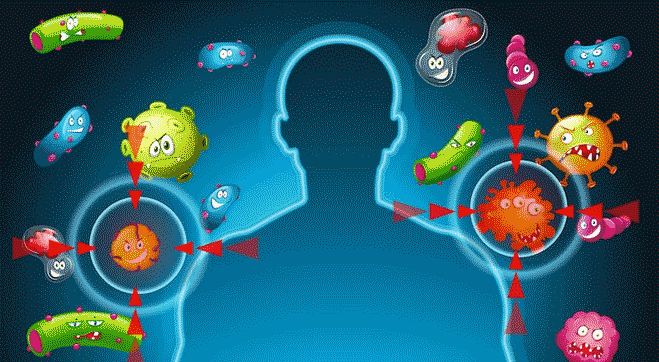Why is Lung Health Important?
Imagine a huge sky in front of you, the fresh morning air filling your lungs as you inhale deeply. The gift of effortless and unrestricted breathing is one that is sometimes taken for granted, yet the significance of lung health cannot be emphasized. Your lungs, those resilient and vital organs nestled within your chest, play a paramount role in your overall well-being.
- Vital Oxygenation: Strong lungs guarantee adequate oxygen absorption and effective carbon dioxide expulsion.
- Support for the Immune System: Strong lungs serve as a barrier, filtering out dangerous substances and bacteria to stop respiratory infections.
- Deep breathing encourages relaxation, reduces tension, and improves general mental and emotional well-being.
- Lung health is important for both longevity and quality of life since it encourages an active lifestyle.
- Protection Against Respiratory Diseases: Keeping your lungs healthy lowers your risk of developing respiratory illnesses like lung cancer, COPD, and asthma.
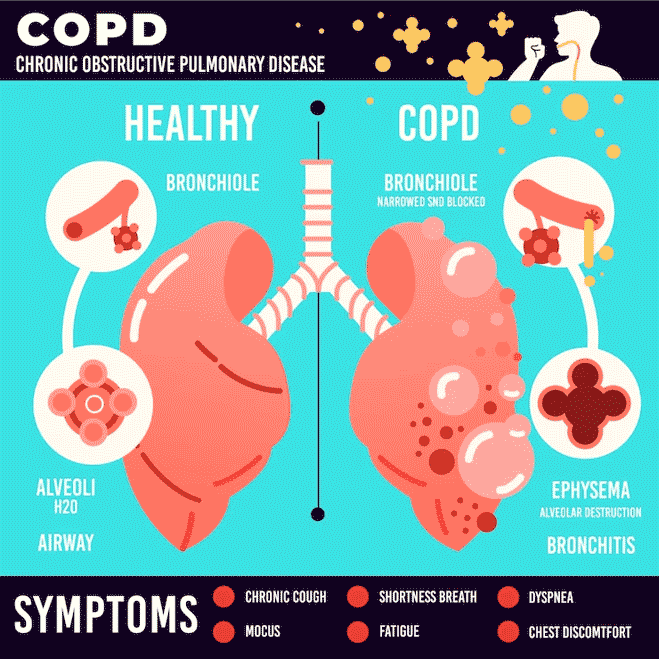
Facts About Lungs
Some of the interesting facts about the lungs are:
- An average human processes around 11,000 liters of air every day during rest.
- It is a little-known fact that one lung is enough for a human to survive.
- An average healthy adult breathes approximately 12-16 times per minute.
- Lungs are the only organs in the human body that float
- A typical adult has 300 million to 500 million alveoli, which are tiny air sacs in the lungs responsible for gas exchange.
- Smoking tobacco is the leading risk factor for lung cancer and other lung-related issues. Passive smoking can increase the risk of lung cancer, coronary artery disease, and stroke.
Reasons Why Your Lungs May Not Be Healthy
Smoking or consumption of tobacco in any form is considered to be the leading preventable cause of death across most parts of the world. Smoking increases health risks including enhanced vulnerability to Covid-19. Apart from this, it is also one of the comorbidities that are the cause of the overall deterioration of health regardless of age or geographical demographic. Within ten seconds of inhaling the first puff of cigarette smoke, the toxic chemicals in tobacco smoke reach one’s brain, heart, and other organs. Any smoker’s test reveals that tobacco smoke by itself contains seventy carcinogens (also known as chemicals that cause cancer).
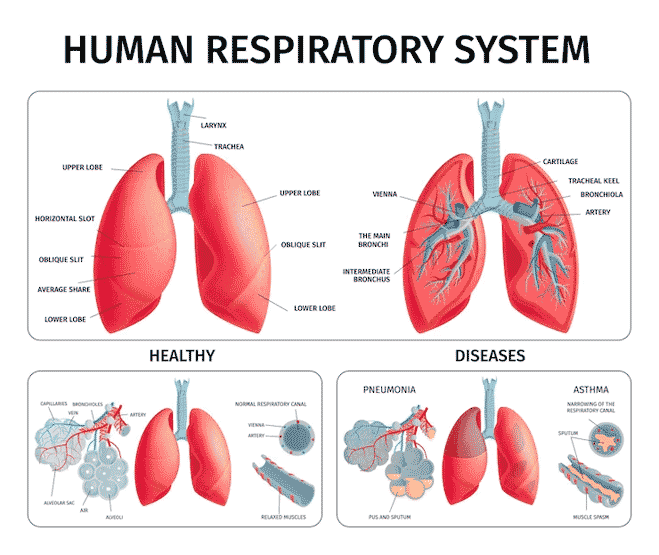
Effects of Smoking on Lungs
A lung checkup indicates that smoking harms almost every part of the human body and increases the risk of several illnesses. Despite it being so harmful, it is also highly addictive as the nicotine in cigarettes releases a chemical known as dopamine in one’s brain. It helps one focus, energizes the system, and creates a feeling of euphoria.
Dopamine is typically known as the achievement chemical and is responsible for people feeling good about themselves after an accomplishment. However, this feeling does not last long and as the nicotine levels drop in the bloodstream, one starts to experience what is commonly known as ‘withdrawal symptoms’. The longer one has been smoking, the more dopamine is needed to retain that feeling. The addiction to smoking is dependent on two factors ‘ nicotine dependence and nicotine withdrawal. Any lung health screening test for smokers depicts that.
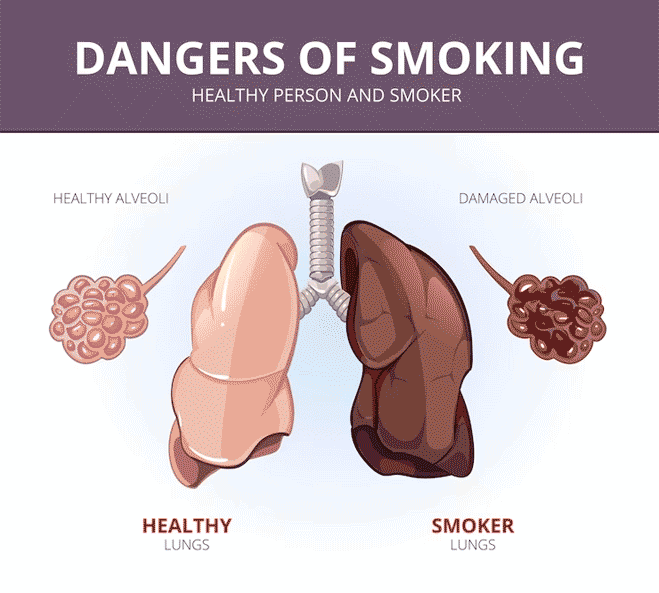
Some of the visible ill effects of smoking for a prolonged duration are:
- LDL – Bad Cholesterol
- Bad Dental Hygiene
- Prematurely Aging Skin (wrinkles, age spots, discoloration, etc.)
- Decreased Desire for Food and General Loss of Appetite
- Erectile Dysfunction and Infertility.
- Reduced lung function and capacity
- Increased risk of lung cancer
- Chronic bronchitis and emphysema
- Persistent coughing, wheezing, and shortness of breath
- Slower healing of lung tissues
- Loss Of Libido In Men
Apart from this, cigarette smoke in the lungs causes ailments like cough, cold, and asthma, which are considered to be the weak lungs symptoms and initial symptoms of lung cancer as well.
Effects of Prolonged Tobacco Consumption on Lungs
According to most established sources including reports published by the World Health Organization (WHO), the life expectancy of smokers is at least a decade less than that of non-smokers. In addition to this, a chest checkup indicates that people who make the effort to quit smoking completely before the age of forty, reduce the risk of dying from a smoking-related illness by almost ninety percent. Yet it is a struggle to get people to quit cold turkey.
- Prolonged tobacco consumption significantly raises the risk of developing specific types of lung cancer, such as squamous cell carcinoma, adenocarcinoma, and small cell carcinoma
- Prolonged tobacco consumption significantly increases the risk of developing various cardiovascular diseases, including coronary artery disease, heart attacks, and strokes
- Prolonged tobacco consumption In men, can lead to reduced sperm count, motility, and quality, affecting fertility. In women, tobacco use can impact the reproductive organs, increase the risk of complications during pregnancy, and harm the developing fetus.
- It increases the risk of gum disease (periodontitis), tooth loss, oral cancers (such as oral cavity and throat cancers), and other dental problems.
- Prolonged tobacco consumption can lead to premature skin wrinkling, skin discoloration, and other signs of aging, affecting both the skin’s appearance and texture.
- Apart from lung cancer, tobacco use can contribute to cancers of the mouth, throat, esophagus, pancreas, bladder, kidney, and cervix.
- It can lead to decreased sense of taste and smell, poor wound healing, increased risk of diabetes, compromised bone health, and overall diminished well-being.
What Tests Help Assess Lung Health?
If detected early the spread of lung cancer can be arrested and possibly cured as well. To do so, several tests need to be undertaken. These blood tests for the lungs are recommended for all smokers as a preemptive strike against any life-threatening illnesses. Let’s check out more about these tests in detail:
- Spirometry: This is the most basic test which needs to be taken to gauge the effectiveness of one’s lung. Another name for this is the PFT (pulmonary function test). It detects lung capacity by simply having the patient inhale and exhale into a machine. This tests the individual’s lung strength and capacity.
- Chest X-Ray: Visual assessment for abnormalities like infections or tumors
- Electrocardiogram (ECG): Tests heart health in smokers by assessing heart rate regularity and detecting potential issues caused by carbon monoxide in tobacco smoke.
- Complete Blood Count (CBC): CBC Test Provides information on red and white blood cell counts, which can indicate respiratory infections or inflammation.
- C-reactive Protein (CRP) Test: Measures CRP levels, a marker of inflammation that can indicate lung-related conditions or infections.
- D-Dimer Test: D-Dimer Test Detects the presence of blood clots, which can be associated with lung-related conditions like pulmonary embolism.
- Antinuclear Antibody (ANA) Test: ANA Test evaluates the presence of antibodies that may be associated with autoimmune lung diseases.
- Procalcitonin Test: Procalcitonin Blood test helps differentiate between bacterial and viral respiratory infections, guiding appropriate treatment options.
Additionally, HealthcareOnTime offers specialized tests tailored for smokers, providing valuable insights into the impact of smoking on overall health. By booking these tests, individuals can evaluate their lung health and understand the specific effects of smoking.
- Smoking Test – Basic (8 Parameters)
- Smokers Test – Advanced (42 Parameters)
- Smoking Impact Checkup (66 Parameters)
How Often Should You Undergo Lung Health Checks?
When it comes to maintaining optimal lung health, regular check-ups play a crucial role. The frequency of lung health checks can be tailored to meet individual needs, but for those without specific lung issues, regular check-ups every 1-3 years are generally recommended. These check-ups serve as preventive measures, enabling early detection and intervention for potential respiratory concerns. Regular monitoring allows healthcare professionals to assess lung function, identify any changes, and offer appropriate guidance for maintaining respiratory wellness.
What factors influence the frequency of tests?
- History of smoking: Individuals with a smoking history may require more frequent lung health checks due to the increased risk of lung diseases and potential lung damage caused by smoking.
- Respiratory symptoms: Persistent respiratory symptoms like chronic cough, wheezing, or recurring infections may necessitate more frequent lung health checks to assess and monitor underlying lung conditions.
- Age-related guidelines: Age-specific guidelines are considered to determine the appropriate frequency of lung health checks as lung function naturally declines with age. Regular assessments help detect age-related lung issues.
- Healthcare provider recommendations: Healthcare providers assess individual risk factors, medical history, and existing respiratory conditions to provide personalized recommendations on the frequency of lung health checks, ensuring optimal monitoring and care.
- Occupational exposure to toxins: Those working in environments with exposure to harmful substances or pollutants may need more frequent lung health checks to monitor respiratory health and detect any occupational-related lung issues.
How to Improve Lung Health?

- To protect your lungs from harm, abstain from smoking and keep away from secondhand smoke.
- Regular exercise will help to expand your lung capacity and strengthen your respiratory muscles.
- Engage in deep breathing exercises to increase lung capacity and enhance breathing effectiveness.
- Limit your exposure to indoor and outdoor pollution to safeguard your lungs from damaging toxins.
- Maintaining good hygiene will help you avoid respiratory infections. Wash your hands frequently and cover your mouth and nose when you cough or sneeze.
- Get Vaccinated, To lower the risk of respiratory diseases, keep your vaccines against the flu (H3N2 Flu) and pneumonia current.
- Maintain a Healthy Weight, To support good lung function, maintain a healthy weight with a proper diet and consistent exercise.
- Reduce Your Exposure to Allergens, To prevent respiratory allergies, reduce your exposure to allergens such as dust mites, pet dander, and pollen.
- Drink plenty of water to maintain the thin mucus layer in your airways and to keep your respiratory system hydrated.
- Maintain a Healthy Diet, To maintain lung health, eat a balanced diet high in fruits, vegetables, whole grains, and lean proteins.
A Note From HealthcareOnTime
For general health and quality of life, maintaining healthy lungs is crucial. You can lower your risk of respiratory problems and benefit from the advantages of better breathing by heeding the advice given above and adopting proactive measures to maintain lung health.
In order to measure and monitor the effects of smoking, evaluate lung function, and offer thorough insights into respiratory well-being, HealthcareOnTime offers specialized lab tests that offer insightful data on how smoking affects lung health.
You may take charge of your lung health, learn more about how smoking affects your general health, and make decisions about your well-being by scheduling these at-home lab tests through HealthcareOnTime.
Disclaimer:
Depending on the individual conditions and advice of medical professionals, several tests may be suggested. Determine the most pertinent and appropriate tests to evaluate your lung health by speaking with a healthcare professional.
Tagged In: Smoking Lungs, Foods for Lung Health, Effects of Smoking in Lungs, Lungs Check Up
Sources
Ref Links:
- https://www.medicalnewstoday.com/articles/smokers-lungs-vs-healthy-lungs
- https://www.nhlbi.nih.gov/health/lungs/lung-health
- https://resphealth.org/healthy-lungs/

